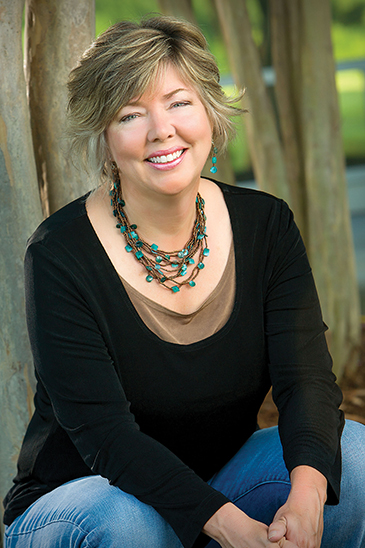Like many new mothers, when Christine Hilt wanted to spend more time with her toddler, she quit her job.
She wasn’t opting to become a stay-at-home mom. Rather, she decided to start her own landscape architecture firm, CLH Design, to escape the rigid schedules set by her employer.
“I started out foolishly,” she revealed in hindsight, as the budding business required more time than she anticipated. While she felt very guilty for not being able to spend more time with her son, Quinn, being a hard-working mom had its silver lining. “My son did sacrifice, but it meant that the quality of the time when we were together was really high,” she said.
Now 20, Quinn grew up “the model free-range child.” Raised to share her love for the outdoors, he follows his parents’ small carbon footprints (father Greg is also a landscape architect) in his love for nature and his interest in pursuing a career in the environmental field.
As a boss, Hilt aims to safeguard her staff against the struggles of her early career, offering a flexible, family-first workplace mentality. “I don’t want their generation to work the 80 hours per week that I did getting deadlines done at 2 in the morning because I couldn’t get the time off,” she said. To add flexibility to her family’s schedule, Greg joined the CLH Design team five years after the company was founded.
About 20 years ago, Hilt took an interest in childhood health. Today, that cause is evident in many of CLH Design’s undertakings. In an effort to raise kids with “green thumbs instead of computer thumbs,” Hilt works with North Carolina school systems to increase environmental education opportunities whenever possible.
“What we’re doing is cutting down on the amount of time that kids are outside rather than expanding it, but if you include curriculum in outside education, you’re doing both,” she said. Guilford County, one of her top education clients, strives to build a community garden in every elementary school. Other initiatives in schools include involving children in building trails, and embracing the needs of sensitive landscapes. When building a school in the Swift Creek Watershed, one principal involved elementary students in planting wetlands.
Hilt often speaks about the hurdle that “latch-key teachers” pose to expanding outdoor education. Most of today’s teachers came from a generation where “they were told to go home and lock the door,” she said, leaving many with hesitations about the outdoors. “We spend more time getting teachers outside than kids.”
On a personal level, Hilt left legacy projects at her son’s elementary and middle schools. “If you walk up to a school to register your child and see flowers and bird feeders and signs, that tells you immediately how much everyone cares about the school,” she said. “If you look at Baucom (Elementary) and Apex Middle today, I think you can see the community even before you walk through the front doors.”
Despite her firm’s reputation as one of the top K-12 designers in the state, boasting more than 300 projects, “This is not a money maker for us,” she said. “This is joyful. This is a cause and a passion.”
What exactly does a landscape architecture firm do? “We design everything five feet outside of the building,” Hilt said — from the aesthetic touches to the “unglamorous things” like water and sewer plans. Recent projects have ranged from a new cave in the polar bear enclosure at the N.C. Zoo to redesigning the downtown Cary streetscape.
Perhaps no surprise, Hilt’s biggest hobbies involve spending time outside. “My husband and I live in our garden and have a house for shelter when it rains,” she said.
Hilt grew up in Charlotte, moving to the Triangle to study landscape architecture at N.C. State. She’s still thoroughly involved with her alma mater, mentoring students through the Women in Landscape Architecture program (which is open to men, too), and recently being named alumnus of the year for landscape architecture.
A highlight of her professional accomplishments came last November when she was inducted into the Council of Fellows of the American Society of Landscape Architects. Only 30 to 40 professionals are admitted nationwide each year, and Hilt describes the honor as the pinnacle of her career.
Amid her accolades, Hilt has endured her fair share of criticism, both as a business owner and while serving on the Apex Town Council. “In this area, people came from somewhere else, and you have to be very open to their new ideas — and bite your tongue sometimes,” she said, recalling a group of elderly men known as “the Triumverate,” who attended all council meetings full of critiques and advice.
She deals with such scenarios with a combination of thick skin and a dash of humor. “If it’s constructive, learn from it. If it’s not, just call them crazy,” she advised.
In her 50s now, the skin that helped her survive in the business world is starting to soften around the edges. “It’s not my job to control everything anymore,” she said with her company’s next generation of employees in mind. “It’s now their turn to lead.”
During the next 12 to 15 years, she hopes to phase out of management responsibilities along with her two partners, Steven Miller and Kenneth Loring. “Nothing would make me happier than if the three of us rode off into the sunset and the company continued to regenerate with younger employees,” she said.
To successfully run a small business, though, they’re going to need skin as thick as hers, she believes. “You’ve got to be really strong, really able to take on a lot of things at one time, and own everything you do — good or bad,” she said. “The buck stops with you. There’s no turning behind you and letting somebody else catch you if you fall.”






